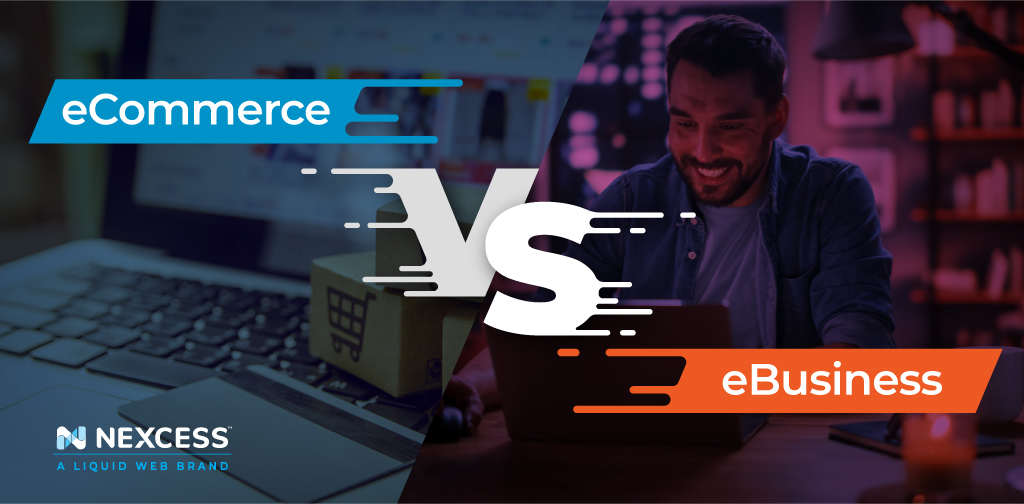Ecommerce. Ebusiness. Same thing, right? Not exactly. So what is the difference between ecommerce and ebusiness?
Ecommerce is selling goods or services online. Ebusiness is conducting business online. So all ecommerce is ebusiness, but not all ebusiness is ecommerce.
It’s like how all squares are rectangles, but not all rectangles are squares. Confused? Don’t worry. We’re not about to launch into a geometry lesson.
At their core, ecommerce and ebusiness deal with using the internet for your business. In this post, we’ll look at the ways ecommerce and ebusiness can transform your business for success.
What is Ecommerce?
So, what is ecommerce?
Ecommerce refers to selling goods and services on the internet. Ecommerce covers everything from Amazon and Walmart to your local bakery selling cupcakes online.
Types of ecommerce include:
- B2C. Business-to-Consumer is a type of ecommerce that includes most traditional retail businesses. The business sells directly to consumers.
- B2B. Business-to-Business ecommerce is about transactions between two business entities. For example, a distributor selling car parts to an auto parts store is a B2B transaction.
One company may utilize B2C and B2B ecommerce channels. A shoe company may sell directly to consumers on their website and have a place for shoe stores to purchase inventory.
Ecommerce is not limited to physical products. You can also sell services like a graphic designer offering logo design packages. Or, you can sell digital products.
Ecommerce can include traditional commerce models as well. Buy online and pick up in-store still utilizes a brick-and-mortar location but is an example of ecommerce since the transaction occurred on the internet.
What is Ebusiness?
Ebusiness refers to conducting business online. Business interactions that were handled in person, over the phone, or with pen and paper now occur on the internet.
You may have heard the buzzword “digital transformation” used to describe this evolution in how businesses operate. Ecommerce is one part of this transformation. Ecommerce covers the sales portion of ebusiness, but other functions from accounting to customer service also can be part of ebusiness.
Types of ebusiness include:
- Cloud Computing. Thanks to the rise of cloud computing and SaaS providers, many companies’ essential functions like accounting, human resources, and IT rely on internet-based software.
- Customer Relationships and Service. From maintaining a support and documentation website to enabling live chat, many customer service functions that required a telephone call now happen online.
- Supply Chain and Logistics. From procurement to shipping, many aspects of companies' supply chain management rely on ebusiness.
Transitioning to ebusiness doesn’t require buying expensive cloud-based software like Salesforce, Oracle, or Workday. The popularity of open source platforms like WordPress allows businesses of all sizes to use ebusiness.
For example, as an alternative to buying project management software, you could use one of these project management plugins for WordPress to build a client portal to keep track of projects and communication between your teams and clients.
Sell your products online, worry-free
Officially recommended by WooCommerce, our hosting is made for online businesses like yours
What is the Difference Between Ecommerce and Ebusiness?
The main difference between ecommerce and ebusiness is that ecommerce is solely focused on sales transactions while ebusiness incorporates other business functions.
Ecommerce vs. Ebusiness
| Ecommerce vs. Ebusiness | Ecommerce | Ebusiness |
| Ecommerce vs. Ebusiness Differences | Ecommerce refers to selling goods or services online. | Ebusiness refers to performing any type of business activity online. |
| Ecommerce vs. Ebusiness Similarities | Ecommerce is one example of ebusiness. | Ebusiness encompasses ecommerce. |
| Ecommerce vs. Ebusiness Activities | Activities include buying and selling. | Activities include procurement of goods or materials, customer relations, selling, and financial transactions. |
| Ecommerce vs. Ebusiness Channels | Typically involves a website or application. Some companies also have social media sales channels that count as ecommerce. | Ebusiness includes any online sales channels and internet-based software systems like CRM, ERP, HCM, and ITSM. |
When to Use Ecommerce and Ebusiness
It doesn’t really matter what you call ecommerce and ebusiness. The important thing is you start incorporating both into your business plan.
The COVID-19 pandemic accelerated digital transformation trends that were already disrupting nearly every industry. Think of how quickly Zoom meetings replaced the need for business travel for in-person meetings.
Ecommerce continues to grow rapidly for both pure-digital and combination online and brick-and-mortar retailers. If businesses don’t take advantage of the internet for ecommerce and ebusiness, they’ll get left behind. Their competitors are transitioning to use the internet more for all their business activities. Failing to make the switch puts companies at a disadvantage.
How to Get Started with Ecommerce and Ebusiness
Adding ecommerce to your business is not as difficult as you think. With Managed WooCommerce from Nexcess, you can set up a new ecommerce website in less than a day.
WooCommerce is the most popular open source ecommerce platform but with managed hosting options – it becomes just that much better. Nexcess provides lightning fast hosting, professional grade tools, and analytics that supercharge your selling.
Thinking about launching an ecommerce store? Check out our Managed WooCommerce plans.

